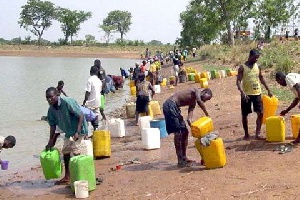 The water crisis in Dzodze is an age-old challenge according to reports
The water crisis in Dzodze is an age-old challenge according to reports
The opposition National Democratic Congress (NDC) in the Volta region has blamed government for the recent water crisis in Dzodze, the capital of the Ketu North Municipality.
According to the NDC, the Dzodze Community Water Management Board which distributes water to the township is unable to work due to government’s failure to pay monies owed them from the distribution of free water introduce by government in the heat of the outbreak of the COVID-19 pandemic.
In a press statement issued by the party and signed by the Regional Communication Officer, Kafui Agbleze the party alleged that “The government owes the Water Board an amount of GH¢425,000 for three months of free water supplied per an independent audit report.”
“The bill has piled up for a year, running into millions of Ghana Cedis owed by the government. This has made it difficult for the company to maintain its machines and equipment, making the the supply of water to thousands of people who depend on the water very difficult,” the statement added.
The NDC further stated that, the situation in Dzodze puts in doubt the commitment of the Nana Addo led government to the Sustainable Development Goal Six (SDG-6) which seeks to ensure access to clean water by all; while calling for work to be expedited on Phase III of the 5-District Water Project located at Adidome.
When fully completed, the 5-District Water project which began under the erstwhile John Mahama administration would provide water for residents in Central Tongu, North Tongu, Adaklu, Agotime Ziope and parts of the Ho Municipality.
But after the commissioning of Phase I and II of the project in December, 2016 work has barely commenced on Phase III.
Background to Dzodze water crisis
The water crisis in Dzodze is an age-old challenge.
The ever-growing peri-urban capital of the Ketu North Municipality, is known for acute perennial water problems; earning for itself, the proverbial tag, “Dzodze nyo gake tsi meli o”, to wit, “Dzodze is good but there is no water.”
It is for this reason that almost every household in Dzodze has a water-tank built ostensibly to store rainwater.
However, in the early 2000s the situation had improved as efforts by stakeholders and successive governments in collaboration with some NGOs began to yield results.
Boreholes were drilled and subsequently mechanized to ensure adequate supply of water to residents -relieving them of the agony and stress they had to go through just to have water to quench thirst and for other domestic use.
This relief may have been short-lived, as the Community water system is unable to meet the increasing demand for the supply of water for residents due the continuous growth in population.
The situation, further worsened in recent times due to a breakdown of some machines of the Community Water System.
The situation is causing a growing lamentation among residents who now rely on the services of tricycles and motorbikes to get water to their homes for a fee.
In a recent interview, a resident known as Christopher Kankpetinge told our reporter that he spends huge sums of money just to get water for his household of eight persons.
He said, “The situation here is terrible and makes life complicated for us. I have not had water flowing through my tap for several months. All attempts to get the waterboard to explain things have proved futile. Surprisingly, there is a reservoir in town where water flows everyday and so we rely on tricycles to fetch the water for us.”
“For my household, I spend GH¢60 every week before we are able to get water.”
For Betty Alornyo, the owner of a guest house, her business has been hard-hit as a result of the water situation.
When the news team reached out to the Chairman of the community water board, he indicated that they are unable to meet demands of residents due to government’s failure to pay them debts owed from the supply of free water introduced by President Nana Addo in 2020.
While admitting the claims by the water board, the Municipal Chief Executive for the area, Anthony Avorgbedor, however, assured that the issues would be dealt with in ensuring the flow of water to the homes of residents.